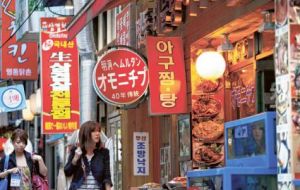MercoPress. South Atlantic News Agency
South Korea leaves basic rate unchanged at 2.75%; inflation running at 4%
 Food and fuel prices are distorting Seoul’s policy to contain inflation
Food and fuel prices are distorting Seoul’s policy to contain inflation South Korea's central bank has left its main interest rate unchanged at 2.75%, bucking a trend that has seen borrowing costs rise across Asia as policymakers try to slow inflation.
Analysts said the bank wanted to see the impact of a surprise rate increase last month before moving again. They now expect borrowing costs to rise in March. The decision comes ahead of the G-20 Finance ministers meeting in Paris.
Inflation has been identified as one of the main threats to economic stability in Asia. In the last month central banks have lifted rates in China, Indonesia and India.
And while South Korea's government has made fighting price growth a top priority, analysts said the central bank also needed to take into consideration the effect of higher rates on the economy.
“It is too soon to raise rates again because the effect of last month's rise is not clear yet,” said Kim Il-Goo, an analyst at Daewoo Securities.
“The central bank raised interest rates 14 times over the past 12 years, but it raised rates consecutively only once”
South Korea's inflation rate is hovering close to 4%, at the top end of the Bank of Korea's 2% to 4% target range.
However, analysts and think tanks believe that interest rates may have little impact on price growth as many of the inflationary pressures were imported in the form of raw material or commodity costs.
“The Korean economy appears to be facing rising inflationary pressure amid a continuing economic expansion and improvement in employment,” the Korea Development Institute (KDI) said in its monthly report on the latest economic conditions at home and abroad.
The assessment comes as the Seoul government has been intensifying efforts to rein in prices since it declared an “all-out war” against inflation.
The government has unveiled diverse measures such as easing import taxes on basic goods, unloading its stockpiles of agricultural products and cracking down on price-rigging in the corporate sector that it fears could lead to a rise in consumer prices.
But it seems to be losing its battle, at least so far, as consumer prices jumped 4.1% last month from a year earlier. The figure is up from the 3.5% rise in December and equal to the 4.1% increase reported for October.
“Due to soaring international oil and agricultural prices, the inflationary pressure is spreading at a fast pace, led by developing countries, which is expected to pose a threat to the real economy in the future,” it added.
The SK government aims to stabilize inflation at around 3% in 2011, while pushing to achieve 5% economic growth, a target that some experts see as overly optimistic, given the current economic conditions.




Top Comments
Disclaimer & comment rulesCommenting for this story is now closed.
If you have a Facebook account, become a fan and comment on our Facebook Page!